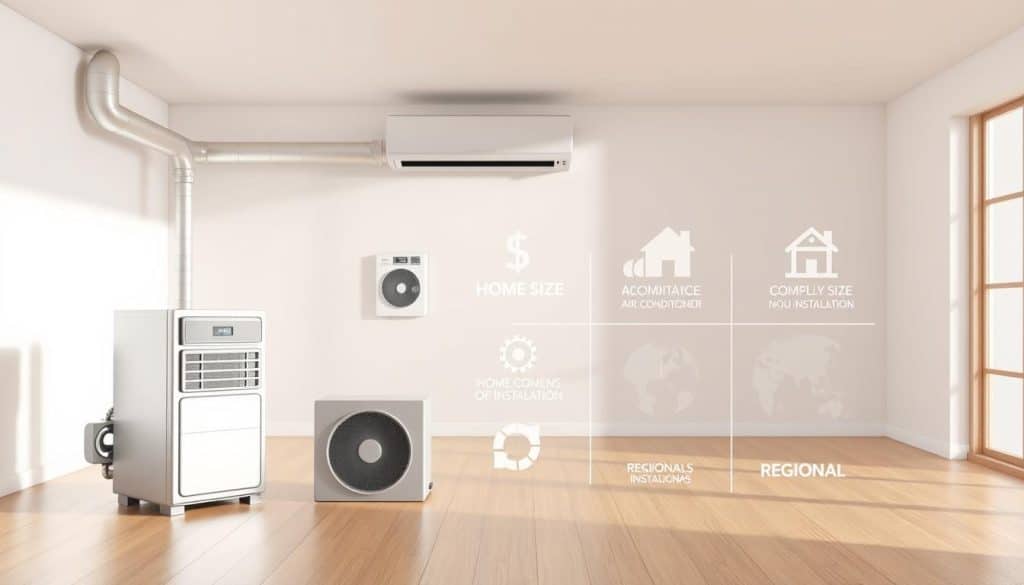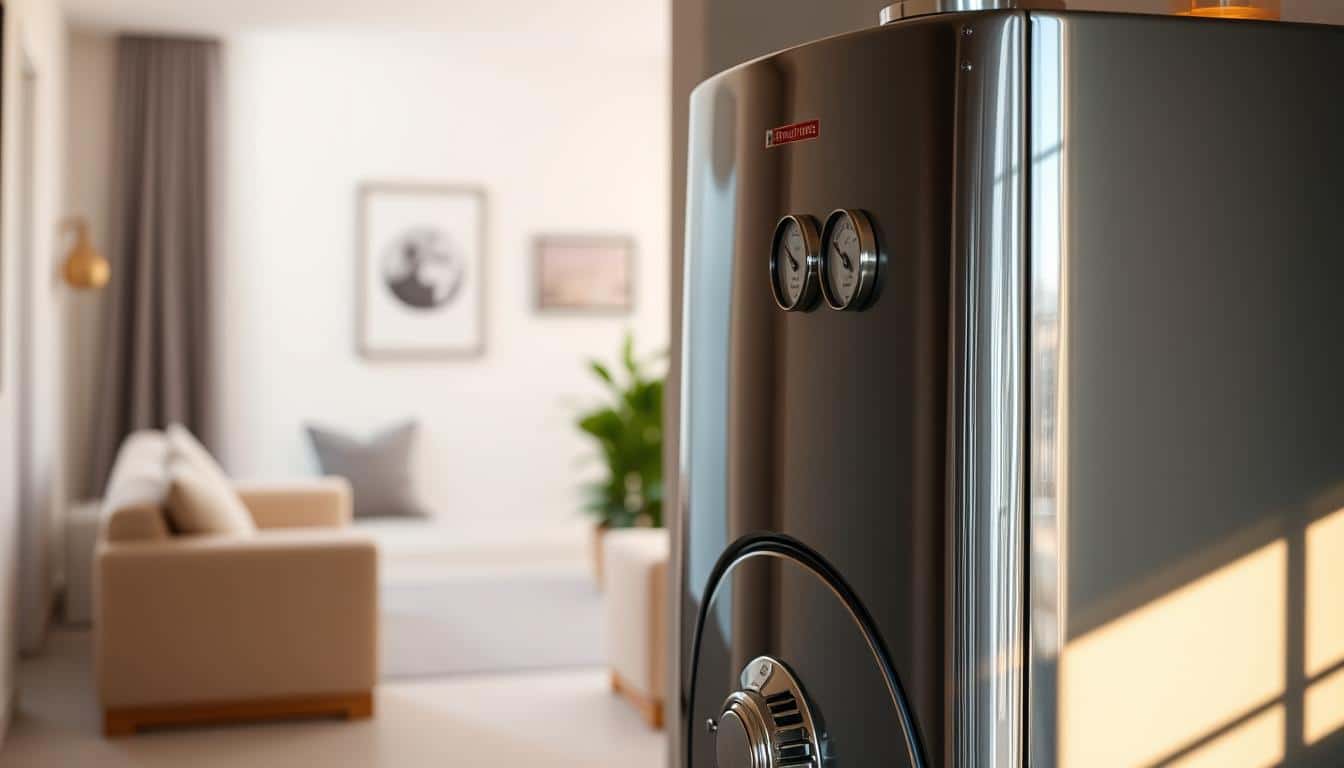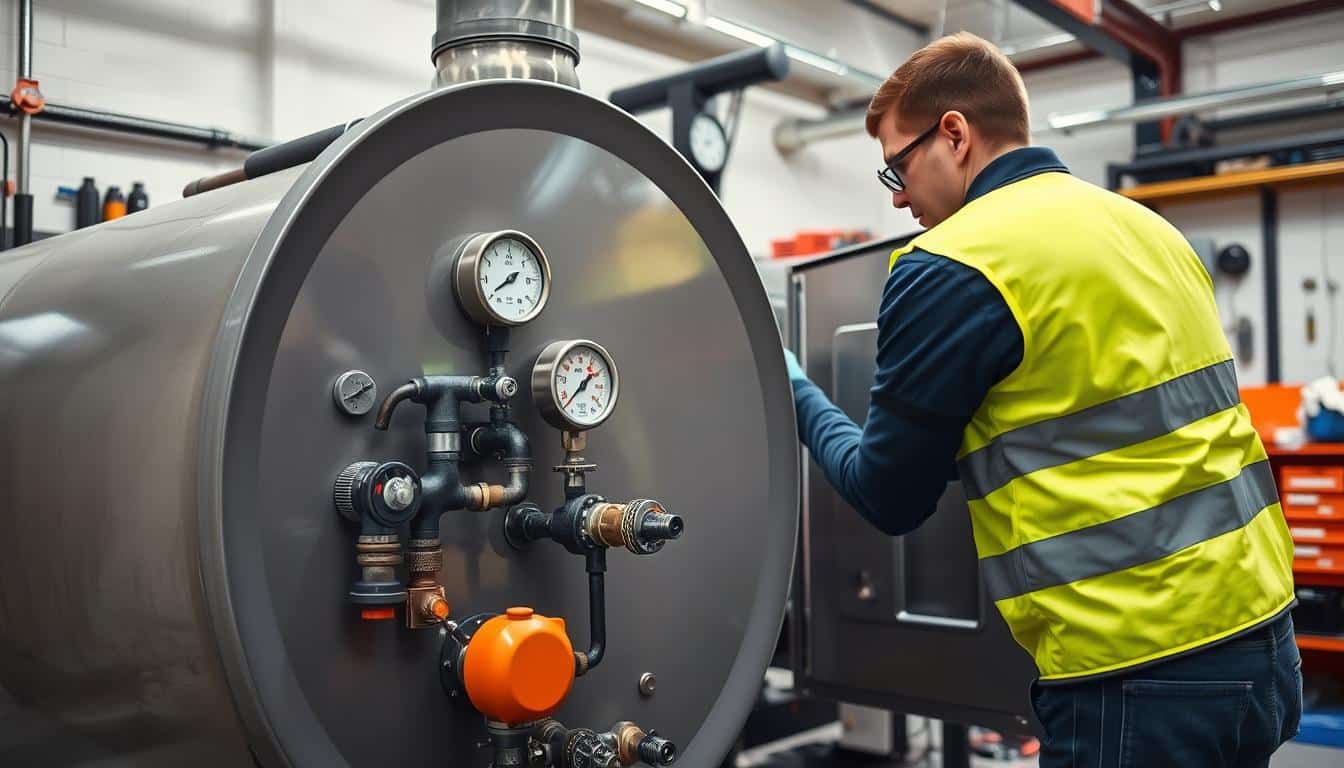Table of Contents
Are you considering upgrading or replacing your HVAC system but unsure about the costs involved? Ever thought What is The Average Cost of HVAC Installation? The average cost of HVAC installation in Canada can vary widely, ranging from $2,700 to $28,000, depending on the type and complexity of the system. Factors such as the size of your home, the need for ductwork, and the efficiency rating of the equipment all play a significant role in determining the final price.
Raye-Van Enterprises Inc., a trusted local HVAC provider with 31 years of experience, specializes in professional HVAC services, including air duct cleaning, AC, boiler, and furnace repairs. Their commitment to quality workmanship, licensed expertise, and 24/7 emergency support makes them a reliable choice for both residential and commercial customers. Contact them at (604) 530-0063 or info@furnacerepairing.ca for expert assistance.
The cost breakdown for HVAC installation includes equipment costs, labor, and additional features like ductwork or smart thermostats. For instance, a standard-efficiency system might cost between $10,000 and $15,000, while a premium-efficiency system could exceed $20,000. Understanding these factors is crucial for homeowners looking to make an informed decision.
This article will provide a detailed breakdown of HVAC installation costs, highlighting the key factors that influence pricing. Whether you’re replacing an old system or installing a new one, this guide will help you understand what to expect and how to plan your budget effectively.
Key Takeaways
- The average cost of HVAC installation in Canada ranges from $2,700 to $28,000.
- System type, ductwork needs, and installation complexity are key cost factors.
- Raye-Van Enterprises Inc. offers professional HVAC services with 24/7 support.
- Premium-efficiency systems can exceed $20,000, while standard systems range from $10,000 to $15,000.
- Understanding equipment costs, labor, and additional features is essential for budget planning.
Introduction and Company Overview
Raye-Van Enterprises Inc. stands as a trusted name in Canada’s HVAC industry, offering top-tier services for over 31 years. Locally owned and operated, they specialize in air duct cleaning, AC, boiler, and furnace repairs, ensuring your home stays comfortable year-round.
Their team of licensed gas fitters and technicians delivers quality workmanship and professionalism, backed by 24/7 emergency support. This commitment to excellence has built a strong reputation among Canadian homeowners and businesses.
About Raye-Van Enterprises Inc.
With decades of experience, Raye-Van Enterprises Inc. understands the complexities of HVAC systems. They provide comprehensive services, from installations to repairs, ensuring your system runs efficiently and effectively.
Our 31 Years of Trusted HVAC Service
Over 31 years, Raye-Van Enterprises has seen industry changes, including rising costs due to inflation and material expenses. They stay updated on these trends, offering solutions that fit various budgets and needs.
Their expertise spans complex installations, ductwork modifications, and smart thermostat integrations, making them a one-stop-shop for all HVAC requirements. By choosing Raye-Van, homeowners invest in reliable, energy-efficient systems that enhance comfort and reduce long-term costs.
Factors Influencing HVAC Installation Cost
When planning for a new HVAC system, several factors come into play that can significantly affect the total cost. Understanding these elements helps homeowners make informed decisions and budget effectively.
System Type, Equipment, and Efficiency Ratings
The type of HVAC system you choose is a major cost factor. Central air systems, heat pumps, and mini-splits each have different price points. For instance, a central air system might cost between $2,500 and $7,500, while a heat pump can range from $3,000 to $8,000. Efficiency ratings, such as SEER and AFUE, also play a role. Higher ratings mean greater energy efficiency, which can lead to long-term savings but may increase upfront costs.
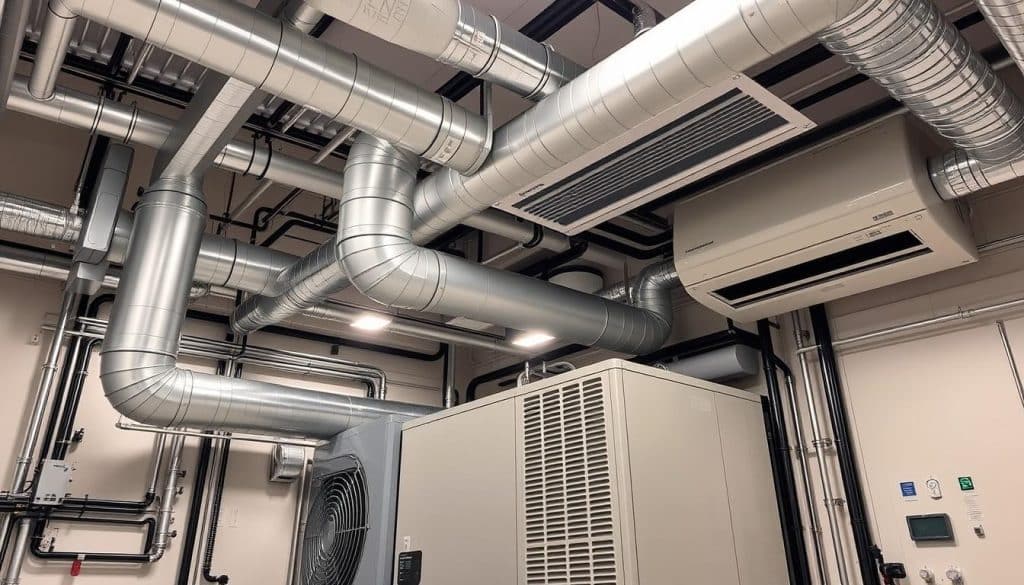
Energy efficiency ratings like SEER (Seasonal Energy Efficiency Ratio) and AFUE (Annual Fuel Utilization Efficiency) are crucial for determining both initial and long-term costs. A higher SEER rating, for example, can reduce energy bills but may increase the system’s price.
Home Size, Ductwork, and Installation Complexity
Home size and layout are key factors in determining HVAC costs. Larger homes require more powerful systems, which can be more expensive. Additionally, the need for ductwork installation or modifications can add to the cost. Ductwork can increase expenses due to the materials and labor required. Installation complexity, such as adding zoning systems or smart thermostats, can also drive up the total price.
Understanding these factors is essential for obtaining accurate quotes and ensuring your system meets your home’s specific needs.
Detailed Cost Breakdown for HVAC Systems
Understanding the costs involved in HVAC systems is essential for homeowners planning to install or replace their current systems. The prices vary significantly based on the type of system and its efficiency.
Central Air Conditioning and Furnace Costs
Central air conditioning systems typically range from $3,500 to $8,500, including installation. Furnaces, whether electric or natural gas, can cost between $1,600 and $10,000. These prices depend on the brand, model, and efficiency ratings.
Electric furnaces are generally more affordable, ranging from $1,600 to $6,900, while natural gas furnaces cost between $3,800 and $10,000. Both options include installation costs and vary based on the system’s efficiency and size.
Heat Pump and Mini-Split System Price Ranges
Heat pumps, including air source and mini-split systems, offer versatile heating and cooling solutions. Air source heat pumps range from $4,500 to $8,000, while mini-split systems can cost between $2,000 and $14,500, depending on the number of units and installation complexity.
These systems often provide higher energy efficiency, leading to long-term savings despite higher upfront costs. The price variations are influenced by factors such as brand, model, and additional features like smart thermostats.
What is the average cost of HVAC installation?
Understanding the costs involved in HVAC installation is crucial for homeowners. The average cost for a residential HVAC system in Canada typically ranges from $5,000 to $12,500. Most homeowners spend around $7,500 for a standard setup, but prices can vary based on several factors.
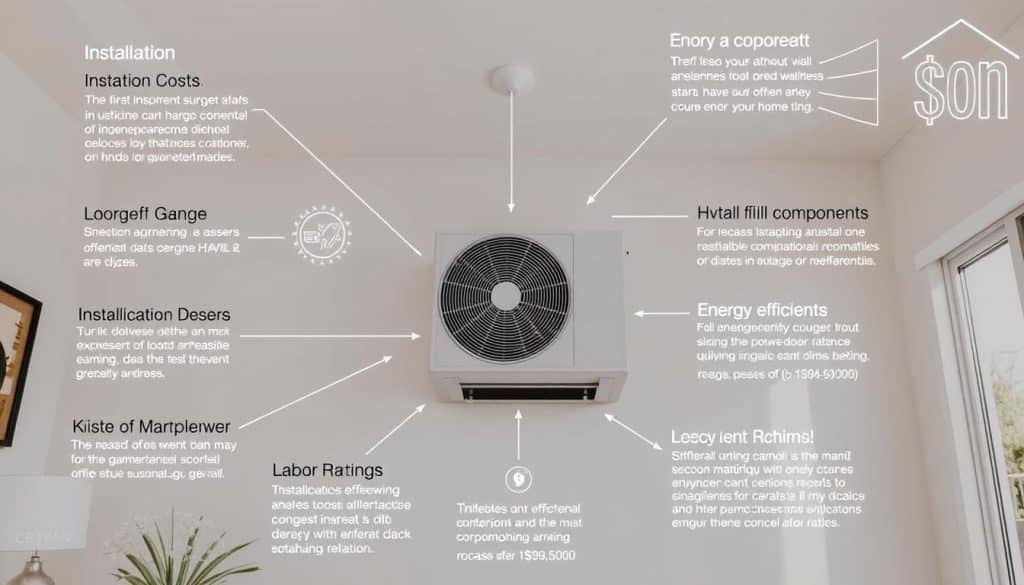
Home size, existing ductwork, and installation complexity significantly influence the final price. For instance, a larger home may require a more powerful system, increasing costs. Additionally, ductwork modifications or custom installations can add to the total expense.
Labour charges and permits are also key considerations. Labour costs typically range from $75 to $150 per hour, and permits can add another $250 to $750. Understanding these breakdowns helps homeowners budget effectively and avoid surprises.
For more detailed information on HVAC system repair costs, visit this resource.
Energy Efficiency and Long-Term Savings
Energy efficiency plays a crucial role in reducing long-term energy costs for homeowners. By choosing an HVAC system with high SEER ratings, homeowners can significantly lower their monthly energy bills.
Understanding SEER Ratings and Energy Efficiency
SEER (Seasonal Energy Efficiency Ratio) measures an HVAC system’s efficiency. A higher SEER rating means the system uses less energy to cool your home. For example, upgrading from a SEER 10 to a SEER 16 system can reduce energy consumption by up to 30%.
Higher efficiency ratings may increase initial costs but offer substantial long-term savings through reduced energy bills.
Cost Savings Through Reduced Energy Bills
Energy-efficient HVAC systems can save homeowners hundreds of dollars annually. For instance, a high-efficiency heat pump can reduce heating and cooling costs by up to 20% compared to older models.
Additionally, many governments offer rebates and incentives for installing energy-efficient systems, further offsetting initial costs.
For more information on identifying HVAC system issues that might be increasing your energy bills, visit this resource.
Choosing the Right HVAC Contractor
Selecting a qualified HVAC contractor is essential for ensuring your system is installed correctly and functions efficiently. A reliable contractor can make a significant difference in both the performance and longevity of your HVAC system.
Licensed Experts and Quality Workmanship
When hiring an HVAC contractor, prioritize proper licensing and insurance. A licensed expert ensures compliance with local regulations and safety standards. Raye-Van Enterprises Inc., with over 31 years of experience, exemplifies this commitment to quality workmanship and reliability.

Their team of licensed gas fitters and technicians provides professional installations and repairs, backed by 24/7 emergency support. This level of expertise ensures your HVAC system is installed and maintained to the highest standards.
Customer Service and 24/7 Emergency Support
Responsive customer service and round-the-clock emergency support are crucial for addressing unexpected HVAC issues. Raye-Van Enterprises Inc. stands out with their dedication to prompt service, ensuring your home remains comfortable year-round.
Check customer reviews and service guarantees to evaluate a contractor’s reliability and customer satisfaction ratings. These factors help you make an informed decision when choosing the right HVAC contractor for your needs.
Government Rebate Programs and Incentives in Canada
Canadian homeowners can significantly reduce their HVAC installation costs through various government rebate programs and incentives. These programs are designed to encourage energy-efficient upgrades, making modern HVAC systems more accessible and affordable.
Ontario and Federal Energy Rebate Options
Ontario offers the Home Efficiency Rebate Plus (HER+) program, which provides rebates for energy-efficient upgrades. Homeowners can receive up to $5,000 for installing a high-efficiency heat pump and an additional $1,000 for comprehensive home energy assessments. Federally, the Oil to Heat Pump Affordability Program (OHPA) offers up to $10,000 for low-to-median-income households switching from heating oil to a heat pump.
Maximizing Savings Through Energy-Efficient Upgrades
Energy-efficient HVAC systems qualify for substantial rebates and tax incentives. For instance, upgrading to a cold-climate air-source heat pump can provide up to $7,500 in rebates. Additionally, many programs offer bonuses for combining multiple energy-efficient upgrades, such as insulation and smart thermostats. These incentives not only reduce initial installation costs but also lead to long-term energy savings.
By taking advantage of these programs, homeowners can enjoy significant financial benefits while contributing to a more sustainable future.
Conclusion
When planning for a new HVAC system, it’s important to consider several factors that can significantly affect the total cost. Homeowners should understand that the type of system, ductwork needs, and installation complexity are key cost factors. Raye-Van Enterprises Inc. offers professional HVAC services with 24/7 support, making them a reliable choice for both residential and commercial customers.
The cost breakdown for HVAC installation includes equipment costs, labor, and additional features like ductwork or smart thermostats. For instance, a standard-efficiency system might cost between $10,000 and $15,000, while a premium-efficiency system could exceed $20,000. Understanding these factors is crucial for homeowners looking to make an informed decision.
Energy efficiency ratings like SEER and AFUE are crucial for determining both initial and long-term costs. A higher SEER rating can reduce energy bills but may increase the system’s price. Additionally, many governments offer rebates and incentives for installing energy-efficient systems, further offsetting initial costs.
By taking advantage of these programs, homeowners can enjoy significant financial benefits while contributing to a more sustainable future. For expert advice and service, contact Raye-Van Enterprises Inc. at (604) 530-0063 or info@furnacerepairing.ca.
FAQ
What factors influence the cost of a new HVAC system?
The cost of an HVAC system depends on several factors, including the type of equipment, its efficiency rating, the size of your home, and the complexity of the installation. Ductwork requirements and labour costs also play a significant role.
How do I determine the right size of HVAC equipment for my home?
A qualified HVAC contractor will assess your home’s square footage, insulation quality, and local climate to recommend the appropriate system size. Proper sizing ensures optimal performance and energy efficiency.
What is the difference between a heat pump and a traditional HVAC system?
A heat pump provides both heating and cooling by transferring heat, while a traditional system often includes a furnace and air conditioner. Heat pumps are generally more energy-efficient in milder climates.
Can I install an HVAC system myself to save money?
No, HVAC installation requires specialized training and tools. Improper installation can lead to safety hazards, reduced efficiency, and voided warranties. Always hire a licensed HVAC contractor.
How long does a typical HVAC installation take?
Installation time varies depending on the system type and home complexity. On average, it can take anywhere from a few hours to several days for a complete setup, including ductwork.
Are there government incentives for energy-efficient HVAC systems in Canada?
Yes, many provinces offer rebate programs for energy-efficient HVAC upgrades. For example, Ontario and federal programs provide incentives for high-efficiency systems like heat pumps and ENERGY STAR-rated equipment.
How often should I maintain my HVAC system to ensure efficiency?
Regular maintenance is essential. Schedule professional tune-ups annually for your heating and cooling systems to maintain performance, reduce energy bills, and extend equipment lifespan.
What does a typical HVAC installation cost breakdown look like?
Costs typically include equipment, labour, and ductwork. Equipment can range from $1,000 to $15,000, while labour and ductwork add $2,000 to $10,000, depending on the system and home size.
How do SEER and AFUE ratings impact my HVAC system’s efficiency?
SEER (Seasonal Energy Efficiency Ratio) measures cooling efficiency, while AFUE (Annual Fuel Utilization Efficiency) measures heating efficiency. Higher ratings indicate better energy performance and lower utility bills.
What should I look for when choosing an HVAC contractor?
Look for a licensed, insured contractor with good reviews. Ensure they offer a detailed cost breakdown and provide guidance on system selection and energy efficiency.
Can a new HVAC system help reduce my energy bills?
Yes, modern HVAC systems with high efficiency ratings can significantly lower your energy consumption and bills. Proper installation and maintenance are key to maximizing these savings.
Are ductless mini-split systems a cost-effective option?
Ductless mini-splits are cost-effective for homes without existing ductwork. They offer zoning capabilities and high efficiency, making them a great option for specific spaces or room additions.
How do SEER and AFUE ratings impact my HVAC system’s efficiency?
SEER (Seasonal Energy Efficiency Ratio) measures cooling efficiency, while AFUE (Annual Fuel Utilization Efficiency) measures heating efficiency. Higher ratings indicate better energy performance and lower utility bills.
What should I look for when choosing an HVAC contractor?
Look for a licensed, insured contractor with good reviews. Ensure they offer a detailed cost breakdown and provide guidance on system selection and energy efficiency.
Can a new HVAC system help reduce my energy bills?
Yes, modern HVAC systems with high efficiency ratings can significantly lower your energy consumption and bills. Proper installation and maintenance are key to maximizing these savings.
Are ductless mini-split systems a cost-effective option?
Ductless mini-splits are cost-effective for homes without existing ductwork. They offer zoning capabilities and high efficiency, making them a great option for specific spaces or room additions.

